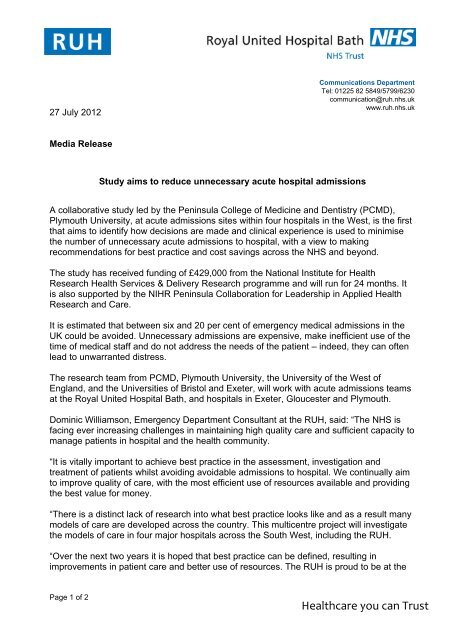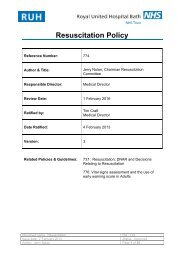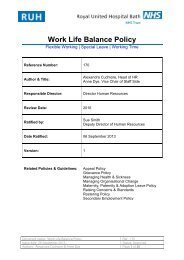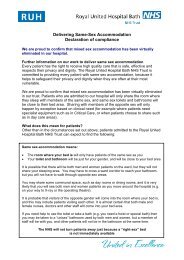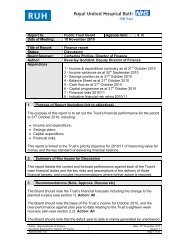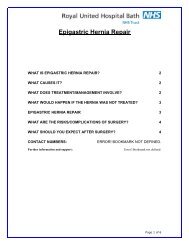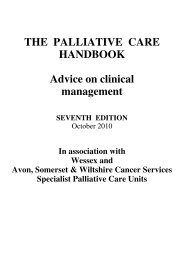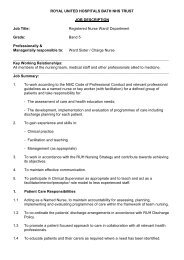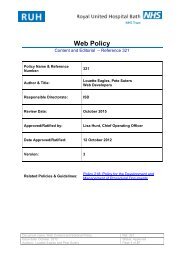Study aims to reduce unnecessary acute hospital admissions
Study aims to reduce unnecessary acute hospital admissions
Study aims to reduce unnecessary acute hospital admissions
You also want an ePaper? Increase the reach of your titles
YUMPU automatically turns print PDFs into web optimized ePapers that Google loves.
27 July 2012Communications DepartmentTel: 01225 82 5849/5799/6230communication@ruh.nhs.ukwww.ruh.nhs.ukMedia Release<strong>Study</strong> <strong>aims</strong> <strong>to</strong> <strong>reduce</strong> <strong>unnecessary</strong> <strong>acute</strong> <strong>hospital</strong> <strong>admissions</strong>A collaborative study led by the Peninsula College of Medicine and Dentistry (PCMD),Plymouth University, at <strong>acute</strong> <strong>admissions</strong> sites within four <strong>hospital</strong>s in the West, is the firstthat <strong>aims</strong> <strong>to</strong> identify how decisions are made and clinical experience is used <strong>to</strong> minimisethe number of <strong>unnecessary</strong> <strong>acute</strong> <strong>admissions</strong> <strong>to</strong> <strong>hospital</strong>, with a view <strong>to</strong> makingrecommendations for best practice and cost savings across the NHS and beyond.The study has received funding of £429,000 from the National Institute for HealthResearch Health Services & Delivery Research programme and will run for 24 months. Itis also supported by the NIHR Peninsula Collaboration for Leadership in Applied HealthResearch and Care.It is estimated that between six and 20 per cent of emergency medical <strong>admissions</strong> in theUK could be avoided. Unnecessary <strong>admissions</strong> are expensive, make inefficient use of thetime of medical staff and do not address the needs of the patient – indeed, they can oftenlead <strong>to</strong> unwarranted distress.The research team from PCMD, Plymouth University, the University of the West ofEngland, and the Universities of Bris<strong>to</strong>l and Exeter, will work with <strong>acute</strong> <strong>admissions</strong> teamsat the Royal United Hospital Bath, and <strong>hospital</strong>s in Exeter, Gloucester and Plymouth.Dominic Williamson, Emergency Department Consultant at the RUH, said: “The NHS isfacing ever increasing challenges in maintaining high quality care and sufficient capacity <strong>to</strong>manage patients in <strong>hospital</strong> and the health community.“It is vitally important <strong>to</strong> achieve best practice in the assessment, investigation andtreatment of patients whilst avoiding avoidable <strong>admissions</strong> <strong>to</strong> <strong>hospital</strong>. We continually aim<strong>to</strong> improve quality of care, with the most efficient use of resources available and providingthe best value for money.“There is a distinct lack of research in<strong>to</strong> what best practice looks like and as a result manymodels of care are developed across the country. This multicentre project will investigatethe models of care in four major <strong>hospital</strong>s across the South West, including the RUH.“Over the next two years it is hoped that best practice can be defined, resulting inimprovements in patient care and better use of resources. The RUH is proud <strong>to</strong> be at thePage 1 of 2Healthcare you can Trust
centre of such important research and is committed <strong>to</strong> learn and continually innovate inthis essential area of patient care.”At the RUH in 2011/12, 60,508 patients attended the Emergency Department, with 26,968being admitted. This compares with 66,228 attendances the previous year, and 25,110<strong>admissions</strong>.The research project will include an analysis of wider health care systems, including carepathways, the role of clinical teams, governance and commissioning. The research teamwill interview lead clinicians and managers, model patient pathways, and estimateassociated costs.It is hoped that the project will address a paucity of research on the variability of <strong>hospital</strong><strong>acute</strong> admission policies both in place and being developed. Analysis of the results of thisresearch project will help <strong>to</strong> form recommendations for best practice.The research team is led by Professor Christian Gericke, Professor of Public Health,PCMD, Deputy Direc<strong>to</strong>r, NIHR PenCLAHRC and honorary consultant neurologist at SouthDevon Healthcare NHS Foundation Trust. He said: “Our research has the potential <strong>to</strong>improve <strong>acute</strong> admission services nationwide, make best use of clinical professional skillsand expertise and, most importantly, make suggestions for changes <strong>to</strong> policy that will havedirect benefit <strong>to</strong> patients. We are grateful <strong>to</strong> our colleagues in Bath, Bris<strong>to</strong>l, Exeter,Gloucester and Plymouth for their collaboration on this project.”EndsThe Peninsula College of Medicine and Dentistry is a joint entity of the University of Exeter,Plymouth University and the NHS in the South West of England. PCMD has created for itself anexcellent national and international reputation for groundbreaking research in the areas of diabetesand obesity, neurological disease, child development and ageing, dentistry, clinical education andhealth technology assessment.NIHR - PenCLAHRC <strong>aims</strong> <strong>to</strong> bring <strong>to</strong>gether local universities and their surrounding NHSorganisations <strong>to</strong> test new treatments and new ways of working in specific clinical areas, <strong>to</strong> see ifthey are effective and appropriate for everyday use in the health service. Where potentialimprovements are identified PenCLAHRC helps NHS staff <strong>to</strong> incorporate them in<strong>to</strong> their everydayworking practices, so that patients across the local community receive a better standard ofhealthcare.The National Institute for Health Research (NIHR) is funded by the Department of Health <strong>to</strong>improve the health and wealth of the nation through research. Since its establishment in April2006, the NIHR has transformed research in the NHS. It has increased the volume of appliedhealth research for the benefit of patients and the public, driven faster translation of basic sciencediscoveries in<strong>to</strong> tangible benefits for patients and the economy, and developed and supported thepeople who conduct and contribute <strong>to</strong> applied health research. The NIHR plays a key role in theGovernment's strategy for economic growth, attracting investment by the life-sciences industriesthrough its world-class infrastructure for health research. Together, the NIHR people, programmes,centres of excellence and systems represent the most integrated health research system in theworld. For further information, visit the NIHR website (www.nihr.ac.uk).


